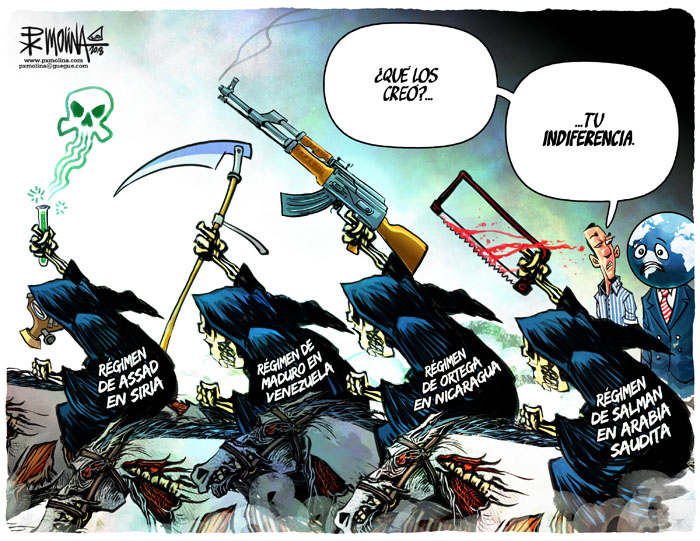22 de noviembre 2018

Ortega Grants Chinese Company a Huge Mining Concession

PUBLICIDAD 1M
PUBLICIDAD 4D
PUBLICIDAD 5D
The processes of obtaining justice can be slow, but they inevitably reach those responsible for brutality. No matter how safe they feel today.

El paso de la justicia podrá ser lento
Probably, many Nicaraguans from younger generations ignore that until a few decades ago most of the Latin American countries were governed by military dictatorships, sustained by a geopolitical concept called “national security doctrine.”
The most emblematic were the dictatorships of the southern cone: Chile, with Pinochet as leader; Argentina, with General Videla; Uruguay and Brazil. In all these cases, dictatorships were the product of coups. The armed forces unleashed a repression that left thousands dead, tortured and missing, in what became known as the “dirty war.”
Each one of these societies tried to close the wounds provoked by such dictatorships: truth commissions, amnesty, trials, pardons, repeal of pardons and amnesties, and retrials. And, finally, imprisonment of the military responsible for the killings. In a nutshell, comings and goings that demonstrated—and demonstrate—that, below the scars, the wounded tissues are bleeding.
I bring up the issue because of the regime’s strategy -because it is a strategy-, to announce a presumed reconciliation that coarsely pretends to cover with a veil of impunity the criminals that have massacred the people throughout these seven months.
Justice sometimes walks slowly, but it gets there. Videla and Galtieri, in Argentina, were condemned for their crimes and died in jail. The chief of the Chilean intelligence services, the “general of death,” Manuel Contreras, was tried and sentenced to 520 years in imprisonment. He died at the age of 83 years old, when he was serving his sentence. In Uruguay, the work of the relatives of the victims brought the trial of several soldiers, avoiding the restrictions imposed by an amnesty law.
In Chile, sentences continue to be issued against military officers for the crimes committed in the period of the Pinochet dictatorship.
I am going to use an excellent commentary published by the United States’ newspaper the New York Times, written by the Chilean intellectual Rafael Gumucio with the title “The paradoxical sentence of the General of Nevermore.” The document has full application for the reality that we live in Nicaragua in the present, and that we will live in the future. Consequently, it should serve as a matter of reflection.
Let me summarize a little. The two reports prepared in Chile on human rights violations in the 17 years of dictatorship that began in 1973, account for more than 3,000 extrajudicial executions, as well as torture, imprisonment and enforced disappearances. Although the regime tried to assure impunity for the perpetrators, the fact is that even in the present, right now, in November, sentences continue to be dictated against Chilean military officers.
One of those sentences is what gives rise to the article that I commented. General Juan Emilio Cheyre was a young lieutenant at the time of the military coup. He participated in the death caravan, which toured the Chilean geography executing the opposition, although it could not be demonstrated that he committed any serious crime. Over time, Cheyre became chief of the Chilean army, in the period 2002-2006, and was known as the “Nevermore” general.”
As military chief, he admitted, on behalf of the Chilean Army, the responsibility that the Armed Forces had in the systematic violation of human rights and withdrew the protection enjoyed by the military who were involved in crimes against humanity. But, on Friday, November 9th, more than 40 years after the events, that same military officer was convicted for covering up, precisely, crimes against humanity.
Justice, when it is real, has its paradoxes: the general that apologized to the victims of the dictatorship, who promised that these crimes will nevermore be committed, last week was sentenced for concealment.
In history there are no amnesties that last forever.
Let me share with you a few lines from the article, which could perfectly well be written for Nicaragua:
“The success of a dictatorship…is based on its ability to make passive and active accomplices of all those that are not its victims.
“Its final triumph is to confuse those two planes: the one that kills and the one that helps the killer, the one who is silent and the one who forgets what he knows or the one who does not know because he does not want to.
“Through different institutional processes, societies can try to clear their conscience. But countries also have a subconscious: that is where the “nevermore” and the attempts to close wounds in a definitive manner fail over and over again. This is what happened to Cheyre. This is what happens to Chile.”
And, I add: this happens and will happen in Nicaragua.
Because the lesson is that when wounds so deep in a society are produced, like the ones inflicted by the Ortega regime on the people of Nicaragua, since April, the steps of justice could be slow, but they inevitably reach those responsible for brutality. No matter how safe they feel now.
PUBLICIDAD 3M
Economista y abogado nicaragüense. Aficionado a la historia. Bloguero y conductor de la plataforma de comunicación #VamosAlPunto
PUBLICIDAD 3D